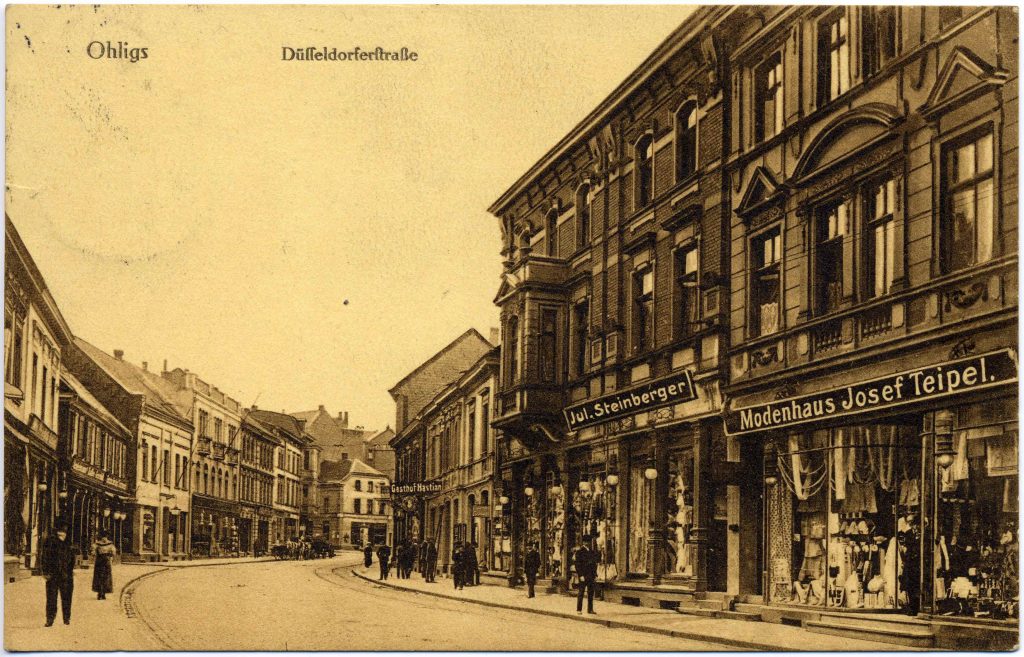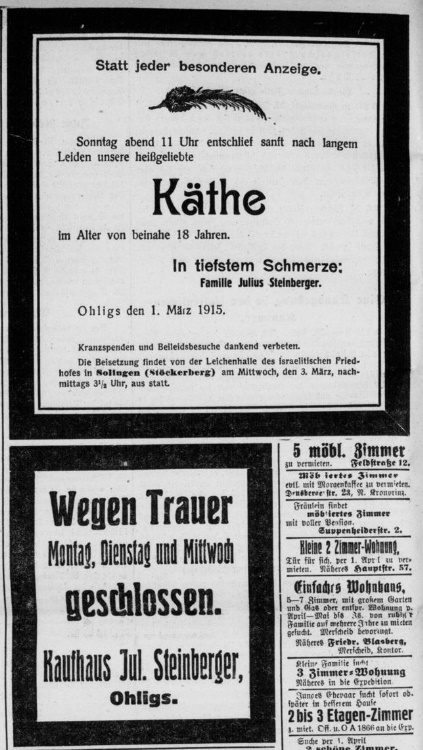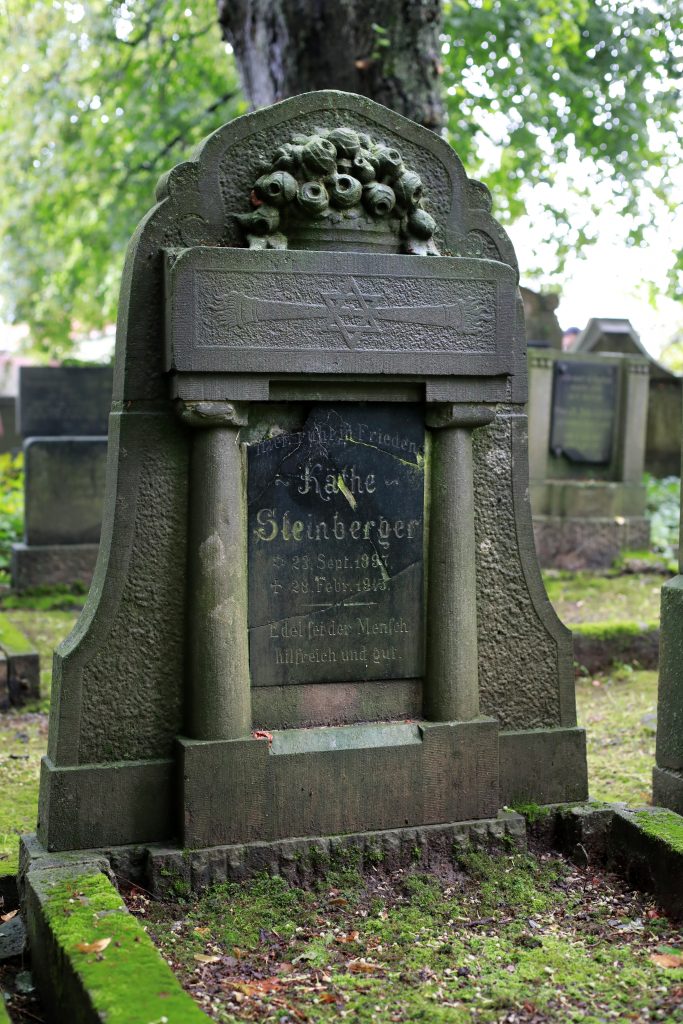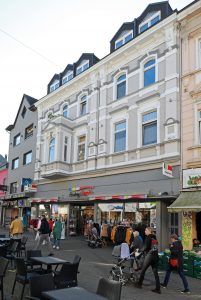Stop 9: The Steinberger and Goldschmidt Families
Düsseldorfer Str. 26 – go to map – go to starting point
Julius Steinberger was born in Lauterbach, Hesse, on 12 July 1872. His wife, Sybilla Herz, was born in Langenfeld-Richrath on 2 February 1872. The couple got married in 1897.

The townlet of Ohligs was turning into a commercial centre and had its main street close to the train station – potentials that Steinberger recognised early on. Shortly before his wedding, he opened [in translation] a “first-rate department store” for “manufactured and fashion items, women’s and men’s clothing” on 3 April 1897. The store was located [in translation] in the “newly constructed building of Mr. Kleefisch” at Düsseldorfer Straße 32 ½ (later: 26). The range of products subsequently included bedroom furnishings, beds, mattresses, bedlinen and curtains.

Sybilla Steinberger gave birth to daughter Käthe on 29 September 1897, followed by son Kurt on 28 October 1899. The couple’s second daughter, Elisabeth, was born on 28 November 1902. In 1912, Julius Steinberger was first elected to the “Repräsentantenversammlung” (literally “Assembly of Representatives”) in Solingen’s synagogue community of which he would become a permanent member.
In July 1914, World War I broke out in Europe. In early October that year, Steinberger advertised the re-opening of his amplified and modernised store. At the same time, he demonstrated his patriotic attitude in the ad, saying [in translation]:
“On the occasion of the opening and out of consideration for the grave times, I have decided to donate 10 percent of my entire revenues made between the 3rd and, including, the 5th of October of this year. The donations will go to Mayor Czettritz of Ohligs and be administered for charitable purposes in the city of Ohligs as well as to the wounded warriors. Department store Jul. Steinberger, Ohligs.”
Julius Steinberger in the local newspaper “Ohligser Anzeiger“ of 3 October 1914 (translation: M.B., 2021)
A couple of months later, the family had to deal with great sorrow. On 28 February 1915, daughter Käthe died after a long period of suffering, aged only 17. She was laid to rest on the Jewish cemetery in Solingen.


Left: Obituaries in the local newspaper “Ohligser Anzeiger” of 1 March 1915. Source: City Archive of Solingen via zeitpunkt.nrw; Right: Käthe Steinberger’s tombstone.
Photo: Daniela Tobias
Next to his functions in the synagogue community, Julius Steinberger also became active in local politics after the war. He was a member of the “Deutsche Demokratische Partei“ (literally “German Democratic Party”). He also advocated the interests of the retail industry as committee member of the Chamber of Commerce and Industry and as chairman of Ohligs’ local trade association.
On 18 June 1925, the Steinberger family came together on a festive occasion: daughter Elisabeth got married to Martin Goldschmidt of Tilsit. After the wedding, Martin worked as procurator, his learned profession, in Tilsit at first. Together with his wife, he returned to Ohligs in April 1928 to join the management of his father-in-law’s newly-founded steel ware company.
After having run his business for 30 years, Julius Steinberger had announced the clearance sale of his department store on 12 August 1927. We don’t have any further information on his reasons for closing. The store’s former location was soon occupied again, with Albert Oster and Karl Wallach opening their retail shop for textile ware, “Oster & Co.”, there in September 1927.
On 1 November 1930, Julius Steinberger started producing and trading razor blades in Ohligs as well as exporting penknives and scissors. The factory was located at Junkerstraße at first and moved to Erholungsstraße afterwards. Julius’ son-in-law Martin Goldschmidt became part of the management, daughter Elisabeth worked there as buyer and correspondent and son Kurt also joined the new business.
After suffering a stroke, Julius Steinberger died in Düsseldorf on 30 October 1932. Different associations and his employees expressed their sympathy in the “Ohligser Anzeiger”. He was laid to rest on Solingen’s Jewish cemetery. His burial took place on 2 November 1932, joined by the top officials of public as well as municipal authorities and by many associations.

Son Kurt Steinberger emigrated to London in as early as 1932. Following her husband’s death and her son’s departure, Sybilla Steinberger had become the sole owner of the steel ware manufacture. In 1933 though, she arranged for her son-in-law Martin Goldschmidt to become silent partner in the company and appointed him as manager. After the National Socialists had seized power, the company still made substantial profits until 1934. 1937 was, however, the first year it incurred losses.
In early 1938, the Steinberger family still seemed to believe that their company had a future in Germany. Advertising in the respective section of the “Central-Verein-Zeitung”, they were looking for a sales representative. The job listing read [in translation]:
“Looking for a Jewish sales representative that is reliable and renowned (with wholesalers and retailers). Will be covering the districts East Prussia, West Prussia, North, Central and South Germany, Frankfurt and Greater Berlin, working for commission. Detailed applications, including references, to: Julius Steinberger Stahlwarenfabrik und Export Solingen-Ohligs.”
Job listing by the Steinberger company in the Jewish newspaper “Central-Verein-Zeitung” of 24 March 1938 (translation: M.B., 2021)
However, Sibylla Steinberger sold all her property shortly afterwards and used the proceeds to pay the “Reichsfluchtsteuer” (literally “Reich Flight Tax”). In October 1938, she travelled to England to see her son Kurt. In early 1939, she then officially emigrated together with her daughter Elisabeth and her son-in-law Martin Goldschmidt.
During the “Kristallnacht“, on 9–10 November 1938, members of the SA (Sturmabteilung, literally “Storm Detachment“) forced an entry to the Goldschmidts‘ flat at Düsseldorfer Straße, ravaging it and abusing Martin Goldschmidt. After the war, he reported [in translation]:
“That night around 1:30 AM, there were 5 to 6 people in SA uniforms demanding entry after they had rang the doorbell. […] Since I was in the corridor on the second floor at the time, I heard how Mrs. N., who lived on the second floor, activated the door opener. I then saw how that woman headed towards these people. Upon entering, the SA men asked Mrs. N.: ‘Where is the Jew?’ Mrs. N. replied: ‘He’s hiding at the Stoll family’s, on the second floor.’ Since I realised that I could not escape the things that were about to happen, I wanted to go back to my flat on the first floor. However, halfway through I ran into the intruders. I was then beaten by the men. All persons present were involved in this abuse. […] One of the men carried an iron bar with him. They went into every room that belonged to my flat and ruthlessly destroyed all of the furnishings, the paintings, the crystalware and ripped the chandelier from the ceiling. […] I heard H. say to my wife: ‘If you don’t stop screaming, I will shoot you down.’”
Source of the German text: LAV, Abteilung Rheinland, NRW Gerichte Rep. 191, Nr. 43, Bl. 82, as quoted in Stracke, Stephan: Der Novemberpogrom 1938 in Solingen im Spiegel der Justiz. Darstellungen und Dokumente, Solingen: 2018, pp. 147 (translation: M.B., 2021)
Martin Goldschmidt was arrested on 10 November 1938, as were two of his neighbours, gynaecologist Dr. Hugo Lichtenstein and merchant Karl Wallach. Together, they were deported to Dachau concentration camp. By his own account, Martin was only released under the condition that he would immediately sell the company and emigrate as soon as possible. His business was “Aryanised” on 5 December 1938 when it was transferred to Eugen Spiecker, a long-time employee of the company.
Martin and Elisabeth Goldschmidt managed to emigrate to London on 14 January 1939. By his own account, Martin did not have any income at first and therefore had to rely on financial support from his brother-in-law. Later on, he worked as self-employed representative. Kurt Steinberger died very young on 1 April 1940. His mother Sybilla passed away on 22 June 1942. Elisabeth Goldschmidt died in London on 8 April 1969, her husband Martin in 1972.
